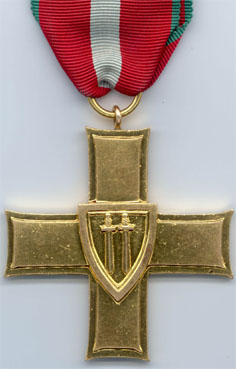
Podporuchik is the most junior officer in some Slavic armed forces, and is placed below the rank of lieutenant, typically corresponding to rank of second lieutenant in English-speaking countries.
Stanisław Dobosiewicz (1910–2007) was a Polish writer and school teacher. He is best known as the author of a monumental monograph of the Gusen part of the former Mauthausen-Gusen concentration camp. Born in Maków Mazowiecki, Dobosiewicz became a lyceum teacher in the interbellum. Arrested in April 1940, in the course of the AB Action, he was sent to Dachau concentration camp and then to KL Gusen, where he spent the entire war.

The Ministry of National Defence is a office of government in Poland headed by the Minister of National Defence. It is responsible for the organisation and management of the Polish Armed Forces. During the Second Polish Republic and World War II it was called the Ministry of Military Affairs. Ministry budget for 2022 was 140 billion PLN.

The Polish People's Army constituted the second formation of the Polish Armed Forces in the East in 1943–1945, and in 1945–1989 the armed forces of the Polish communist state, ruled by the Polish Workers' Party and then the Polish United Workers' Party. The communist-led Polish armed forces, allowed and facilitated by Joseph Stalin, were the result of efforts made in the early 1940s in the Soviet Union by Wanda Wasilewska and Zygmunt Berling.
Karol Szwedowski (1878–1941) was a Polish master builder who worked at Westerplatte and defended it when Poland was invaded by Germany in 1939.

The Polish hussars, alternatively known as the winged hussars, were a heavy cavalry formation active in Poland and in the Polish–Lithuanian Commonwealth from 1503 to 1702. Their epithet is derived from large rear wings, which were intended to demoralize the enemy during a charge. The hussars ranked as the elite of Polish cavalry until their official disbanding in 1776.

The Order of the Cross of Grunwald was a military decoration created in Poland in November 1943 by the High Command of Gwardia Ludowa, a World War II Polish resistance movement organised by the Polish Workers Party. On 20 February 1944 it was confirmed by the State National Council and on 22 December by the Polish Committee of National Liberation and further confirmed on 17 February 1960 by the government of the People's Republic of Poland.

Mariusz Błaszczak is a Polish politician, historian, and local government representative. Błaszczak has served as Minister of National Defence of Poland from 2018 to 2023.

The Ochota Massacre was a wave of German-orchestrated mass murder, looting, arson, torture and rape, which swept through the Warsaw district of Ochota from 4–25 August 1944, during the Warsaw Uprising. The principal perpetrators of these war crimes were the Nazi collaborationist S.S. Sturmbrigade R.O.N.A., the so-called "Russian National Liberation Army", commanded by Bronislav Kaminski.
The Women's Auxiliary Service (WAS) (Polish: Pomocnicza Służba Kobiet (PSK), Pestki) was a unit of Polish Armed Forces during World War II established in 1941 by initiative of Lt. Gen. Władysław Anders, while creating Polish Armed Forces in the East.
The army cooperation aircraft was an inter-war concept of an aircraft capable of support of ground units in a variety of roles. Army cooperation planes combined the roles of artillery spotter aircraft, liaison, reconnaissance plane and close air support.
Leszek Gondek ) was a Polish lawyer, historian, essayist, and writer specializing in 20th-century European and Polish history. He was a professor at the Gdansk University of Physical Education and Sport.

Antoni Wysocki was a Polish military commander. He was a member of the Greater Poland Uprising, the commander of the Wilda military campaign, which was the first to reach the Bazar Hotel on the day of the outbreak of the insurrection.

The Battle of Krasnobród took place on 5–6 October 1672, during the Polish-Ottoman War. It was part of Jan Sobieski’s autumn expedition, aimed at the destruction of mounted Tatar units, which plundered southeastern provinces of the Polish–Lithuanian Commonwealth.
Andrzej Feliks Grabski was a Polish historian and medievalist.

The War Studies University is the highest military academic institution in Poland. It was formed by Ministry of National Defence in 2016 in place of the former National Defence University Academy established in 1990. Minister of National Defence Wojciech Fałkowski explained that the reorganization of the academy was inspired by the need to improve the proportion of military students in the university's overall profile.

Bernard Stanisław Śliwiński (1883-1941) was a Polish doctor of law, insurgent during the Greater Poland uprising, Lieutenant colonel in the Polish Armed Forces infantry, district commander of the state police, Mayor of Bydgoszcz and recipient of the Knight's Cross of the Order of Virtuti Militari.

Romuald Szeremietiew is a Polish politician, columnist, habilitated doctor of military sciences and associated professor at the Academy of National Defense and the War Studies Academy. He was a founding member of the Confederation of Independent Poland, an anti-communist, Sanationist independence movement. He became a member of the Sejm in 1997 and served as the Minister of National Defense in 1992 and Vice-minister in 1997.

Central Military Library (CBW) is the main library of Poland Ministry of National Defense located in Warsaw. In 2009, she was awarded the Gloria Artis Medal for Merit to Culture.













